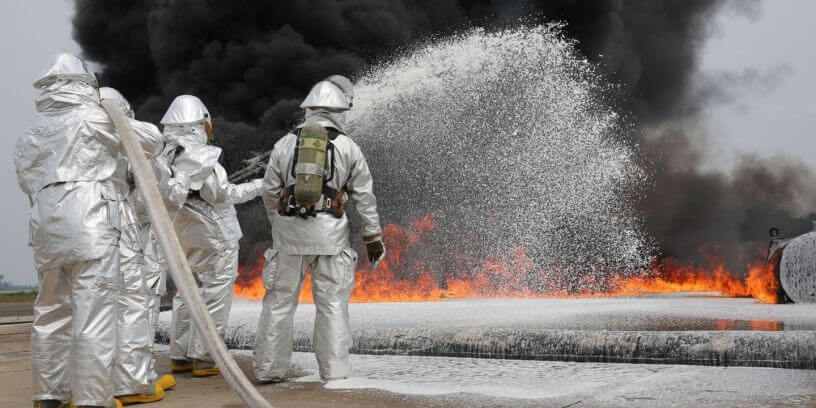State Task Force Hears From Chemical Lobby
American Chemistry Council fights regulation of dangerous chemicals.

Marines fighting fires with foam, a product that uses PFAS . Photo by Lance Cpl. Shawn Valosin/U.S. Marine Corps.
The Speaker’s Task Force on Water Quality is tasked with this mission: “To protect a healthy and stable supply of water for residents and industry.”
To that end it has gone around the state hearing testimony from a wide variety of invited groups and speakers–governmental, environmental, industry, farmers, academics and state agencies, among others. Invited guests have ranged from Wisconsin Manufacturers and Commerce to Clean Wisconsin.
All this is laid out nicely on its detailed but digestible website that shares informational resources and accepts public comment.
Yet one group whose point of view is presented by the task force stands out for roles it has long taken in downplaying the dangers of PFAS (a group of more than 4,000 perfluoroalkyl and polyfluoroalkyl substances) and other chemicals contaminating water supplies. It’s the American Chemistry Council (ACC).
“These are not the folks who the task force should be listening to,” says task force member Rep. Staush Gruszynski (D-Green Bay). “The group’s history is to lobby state government to slow things down or to not regulate at all.” He points to a string of arguments they make: “‘We don’t have enough science,’ ‘slow down before you regulate,’ ‘the cost is too high.’”
ACC: Voice of the chemical lobby
Looking into the ACC and its chain of ties leads straight to its relationship with President Donald Trump’s rejected nominee to run the Environmental Protection Agency (EPA)’s Office of Chemical Safety and Pollution Prevention, Michael Dourson. He withdrew from consideration after a storm of controversy about his consulting business where he was paid to criticize studies that raised concerns about the safety of his clients’ products. He has been called the “voice of the chemical industry” and was paid by ACC while providing advice to states on chemicals made by ACC members.
ACC’s Scott Risotto—who was invited to testify before the Wisconsin task force—calls Dourson, “Professor D” in a series of emails obtained by the New York Times that led to several Republican U.S. senators refusing to confirm Dourson. These emails demonstrated a close relationship between ACC and Dourson, who took money from trade groups that would edit drafts of his papers before he published them.
But perhaps the most discrediting and concerning report on ACC and Risotto came from an investigative piece in The Guardian, “Internal emails reveal how the chemical lobby fights regulation.”
The investigation shows a variety of dangerous chemicals that ACC has lobbied against regulating, including “a degreaser called trichloroethylene (TCE), dangerous enough to humans that the Obama administration sought to ban its use as a spot treatment in dry cleaning. It has been linked with the organ problems…as well as cancer and birth defects.” The EPA at that time labeled it “carcinogenic to humans by all routes of exposure.” Now Trump’s EPA has chosen not to finalize the ban.
This request to suspend implementation of an EPA memo on hastening TCE cleanups came straight from Risotto—the expert invited to testify to the Wisconsin Speaker’s Task Force. ACC has criticized science and regulation surrounding other chemicals, including asbestos, formaldehyde and hexavalent chromium (AKA Chromium-6, the drinking water contaminant made infamous by Erin Brokovich). ACC was also involved in the scandal around the EPA blocking the release of news that most Americans inhale enough formaldehyde to be at risk for leukemia.
Welcoming ACC to Marinette
Without drawing much attention, the American Chemistry Council testified before the Speaker’s Task Force on Water Quality on a Thursday morning in late August at the UW Green Bay – Marinette Campus. Citing a travel conflict, Risotto was replaced by ACC colleague Jessica Bowman who shared this Powerpoint presentation.
Raj Shukla, executive director of the River Alliance of Wisconsin, was also testifying to the task force in Marinette the same day as ACC on his group’s work with farms on clean water. As an audience member he heard the ACC presentation and his personal observation is that the task force did not seem swayed by it, given other very detailed discussions of the dangers PFAS.
“This is about a vital resource–for our health, for agriculture, for tourism, for economic opportunity and it is clear we take a grave risk if we don’t protect it,” says Shukla. “Looking at the task force members on the stage (as ACC presented), I don’t think anybody was buying it.”
For Gruszynski, this is personal. He grew up in Marinette, where PFAS concerns linked to a Tyco plant have caused enough public outrage that the Department of Natural Resources is hosting a series of six monthly meetings on the topic, as reported yesterday in the Examiner.
“It’s my home town,” says Gruszynski. “All that contamination happened right near my high school. The more you peel away the layers of the onion on chemicals like PFAS, the more you find. At the end of the day, this is the question: What’s the price of clean water?”
Reprinted with permission of Wisconsin Examiner.




















